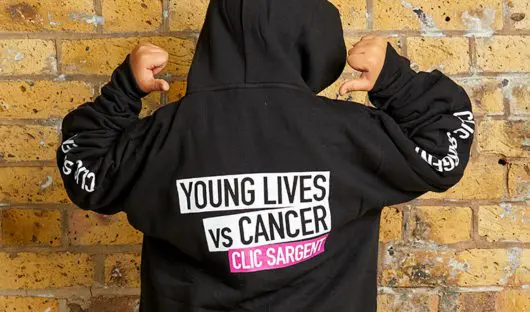Caring for brothers and sisters when your child has cancer
Siblings can be deeply affected by their brother or sister's cancer. This is can be an additional worry for parents, at an already difficult time.
Sibs is a UK charity which supports siblings of all ages to help them cope with the impact of their brother or sister’s cancer. Sibs also provides information and guidance for parents on how to support siblings. Sibs shared some advice with members of Young Lives vs Cancer Parents and Carers Facebook group.
Parents often worry that telling a sibling their brother or sister has cancer will upset them too much. Or that they’re too young to understand. But children are very good at picking up when something ‘big’ is going on. It’s important to talk to them openly and honestly so they don’t imagine the worst.
Children can also feel angry and lose trust if they feel a parent isn’t being truthful with them.
-
Talk to your child’s sibling at diagnosis. This may feel very hard, but talking and explaining is always better than trying to avoid the subject – even for little children.
-
Answer questions as they come up. Be open and honest; this helps your sibling child to trust you.
-
Keep siblings up to date if things change. They will also need more detailed information as they get older.
-
You don’t always have to communicate things through a conversation. It may be easier for both you and your child’s sibling if you explain things through activity. If they’re little you could try talking to them while playing or reading a story. If they’re a bit older you could talk to them while making a scrapbook, or have a question box. This opens up difficult discussions in an easier way.
-
Practise role-playing with them to find a short and easy way to talk about their brother or sister’s illness. This will help them feel more confident if their friends as about it. It doesn’t need to be detailed and should be age appropriate.
Some siblings have a hard time coping with the effect of their brother or sister’s diagnosis on their family, school, and social life. These feelings may be shown in many different ways. They might experience trouble managing relationships, struggle to stay motivated, feel angry or even guilty as their life continues, lose focus at school or become easily upset. All of this is completely normal. Siblings’ feelings and experiences may change over time. By being aware of the feelings a sibling may have, you can take action to help your sibling child cope with them.
- Acknowledge their feelings, especially when unusual or violent behaviour is being displayed. This can help siblings feel safe to express themselves with you or others. It can encourage them to regain some control and ultimately them communicate how they are coping
- Make a plan with the sibling about how to keep them safe. This might mean going to their bedroom when their brother or sister displays challenging behaviour, phoning a family member and talking through their feelings, or asking for help if they need it. In some cases it might also be beneficial to work together with them to form a plan of what might happen in the event of an emergency. This can reassure them and help them to feel safe.
- Siblings require support too and it’s important this is recognised. Siblings tell us that they often feel that nobody is interested in what life is like for them when they have a brother or sister who is seriously ill. They also share that having a parent just ask how they are doing can make a huge difference to how they cope with things in the longer term.
- Try and see the emotion behind the behaviour. A sibling may show negative behaviour because they are worried about their sibling and this is the only way they know how to let their emotions out. Encourage them to talk and ensure that they know that you will listen.
- It’s also really helpful if you talk to the school about how you feel the sibling is doing. They may be able to offer pastoral support or the opportunity to talk to other siblings who may be in a similar position.
- Siblings find it helpful to share what life is like for them with other siblings. Talking to someone they can relate to helps them feel less alone. It may be useful to contact your social worker, local team or a charity who could link siblings.
- If behavioural changes become extreme or concerning, contact your GP to talk about how your sibling child is coping. Your GP is a really good place to start when looking for help for your sibling child. They will be able to refer them on to any available mental health support services such as CAMHS if they feel that this is appropriate
- You may not be able to change what is happening, but you can respond to how all of your children feel about things in a way that makes them know you really care and understand. Have a look at our page on acknowledging feelings for more help.
As a parent carer of a child who has a serious illness, you already have a lot to do. Giving equal attention to siblings may seem like another task in a family that is already very busy and you may feel overwhelmed and guilty. Recognise that you are doing your best to try to meet the needs of all of your children at a very challenging time. It’s important to remember that giving attention doesn’t have to take lots of time and can be really beneficial to the whole family. It is better for each of your children to have your full attention for a short amount of time, than a lot of time with distractions. A small amount of one to one attention will help them in the following ways:
- It will show them that you love them and that they matter too. For example, a sibling will feel loved when they find a nice note from you in their school lunch box.
- It helps to reduce jealousy of their brother or sister when a sibling gets one to one time with you. For example, a sibling having 15 minutes each day to play a game with you or to talk about their day.
- It helps siblings develop good behaviour when you give them attention for doing the right thing. For example, when your sibling child is playing well with another child, give a thumbs up and say ‘great playing.’
- If siblings don’t get attention they often feel that they are second best or left out. Siblings may think that the reason you give more time to their brother or sister is because you love him or her more. Lack of attention can lead to problem behaviour as a way of getting your attention.
When a child receives a diagnosis it affects the whole family, and parents can find it quite a challenge to meet the needs of all their children. Sibling rivalry is about the everyday jealousy and squabbling that takes place between siblings. Children usually provoke each other either to get more attention from a parent, to get their brother or sister to be with them or play with them, or to gain a sense of power over the other child.
Parents often find this hard to deal with, especially when it’s between a sibling and a child with an illness, disability or condition. Positive sibling relationships need to be worked in all families. Tackling issues of fairness can help develop more positive relationships for all the family.
- Siblings often interpret that because you need to spend more time with their brother or sister, it might mean that you care more for them. Siblings really value time spent with a parent which is just for them. This doesn’t have to be a long period of time but can help to improve behaviour, reduce jealousy and help them to feel loved. 15 minutes per day for your sibling child to have your undivided attention can make a huge difference to their mental well-being both in the short and longer term.
- If you are going to be away from home for longer periods, aim to get home in between. This can be for a meal or event at school or to spend time together. It may be not be possible at a longer distance, but it helps the sibling adjust better if they can be with you. Make sure you try to have a phone conversation or video call each day with the sibling child/children at home.
- Communicating with a sibling can help them to understand that their brother or sister gets more attention from a parent because they need more help, and not because the parent loves the child with additional needs more.
- Communication helps siblings understand why things are different with their brother or sister. It also helps to improve the relationship between siblings and their brothers and sisters. For example, if a child has difficulty playing, a sibling can be helped to understand that this is because of the disability or condition, and not because their brother or sister doesn’t like them.
- It’s important to rebalance the power by avoiding blame, helping them to have other ways to feel in control and have rules about what you will and won’t accept from either child in the way of behavioural issues.
- Even from a very young age, or from a simple level, siblings find it really helpful to understand why their brother or sister behaves in the way they do, such as behaviour influenced by steroids.
When a child receives a diagnosis, we know that it can be very difficult for families and siblings can find it particularly challenging. Routines have changed, there may be a change at school/nursery, loss of contact with friends and family and usual hobbies or activities taking place outside of the home stop. It’s also common for sibling children to struggle a lot with changes in routines that come with things such as appointments and hospital stays. Here are a few things that might be useful to think about to help siblings:
- Talk about what is going to happen and when. Mark the dates on a calendar – talk about what routines will be in place for them when you are away, and who will help to look after them.
- Ask if there are any things that are particularly important at that time – things at school or a friend’s party. Reassure them that they can still do these things and that aunty/grandma/whoever will be told they are important and will make sure they happen.
- Even young children quite like to know what is happening to their brother or sister while they are in hospital. Do a drawing to explain where he needs treatment, explain about why this appointment/scan is important for their brother or sister, talk about some of the things that may happen in hospital. If they are not easy to explain verbally, role play with a doll to explain the procedures. Include normal everyday procedures as well, such as having food, playing with a toy, so that familiar things are included.
- If your child has to go into hospital for treatment, ask the hospital play staff to help support your sibling child/children too. They may be able to do this themselves or may know of other local organisations who can.
- The most significant factor in sibling adjustment to hospital stays is the length of time away from the parent and brother or sister. Try and build in some one-to-one time with your sibling child/children, and where possible between the child and the sibling to. Book in time when you can just hang out together, maybe bake a cake or just watch a film together one-to-one. Siblings could play a virtual game together or one could read the other a book to stay connected whilst they are apart.
- When you are away at hospital ask your sibling child to draw or write things to bring when they visit. Get someone else to keep a diary of all they have been doing so that you can talk about these everyday things together. They need to feel that these ‘normal’ things are still important to you. This will also keep everybody involved in these ‘everyday’ conversations and help ease back into the routine once you are all at home together again.
- Ask other people to help the sibling carry on with their activities and events at home. Things like clubs after school, having friends round, going shopping for clothes, going for a sleep-over. If other things change as well as a parent and brother or sister being away, the sibling can feel a double sense of loss.
Sleep and nightmares can be an issue for lots of siblings, for all kinds of reasons. Your family will have gone through a great deal of change since diagnosis, and children can show their distress in a number of different ways. Siblings are likely to have to making quite a lot of adjustments – they may be missing you if you are having to spend time away at the hospital or if you are having to provide extra care for a sibling. Siblings might have additional worries about their families getting sick, or what will happen if there is an emergency for their brother or sister. They may have worries that they cannot easily explain. All this may affect their sleep and night time routines. Here are a few things that might help:
- Try to keep to a good bedtime routine. Going to bed at the same time each night and getting up at the same time each day, even at weekends is helpful for children and helps them to support their natural body clock.
- Try to make sure there is a routine that is kept by whoever is caring for your child. So perhaps bath time, story time or bedtime song are always done in the same order. This gives consistency and reassurance.
- Avoid screens such as televisions, mobile phones and computers in the hour before bedtime. They can supress the sleep hormone and make it harder to for your child to nod off.
- Try to spend some one-to-one time with your child during the day. Make time to talk to them about what is happening in language your child can understand. Even quite young children have questions and concerns about what is happening. Use drawings, books and toys to help explain. This might help to ease some of the worries which come out at night time.
- Talk about positive things before your child goes to bed. Asking them to say three good things about their day is one way to do this and can be built into their bedtime routine.
Navigating step families at the best of times can sometimes prove tricky. Following a diagnosis, siblings and step siblings can struggle with the increase in separation they may experience. They can find it hard not to spend as much time with other family members. It’s important to find safe ways to help them stay in touch with people that are important to them and that are usually a part of their lives. There are lots of different ways you can do this:
- Video calls, such as FaceTime or Skype
- Emailing, texting or messaging
- Writing a letter to a family member describing what they’ve been doing
- Sending your step sibling or stepchild a postcard or a letter
- Sending a photograph or writing them a story
- Keeping a video diary of what they have been up to so that they can share this with you
- Ask them to take 3 photographs a day – perhaps you can all share them with each other when you get in touch


